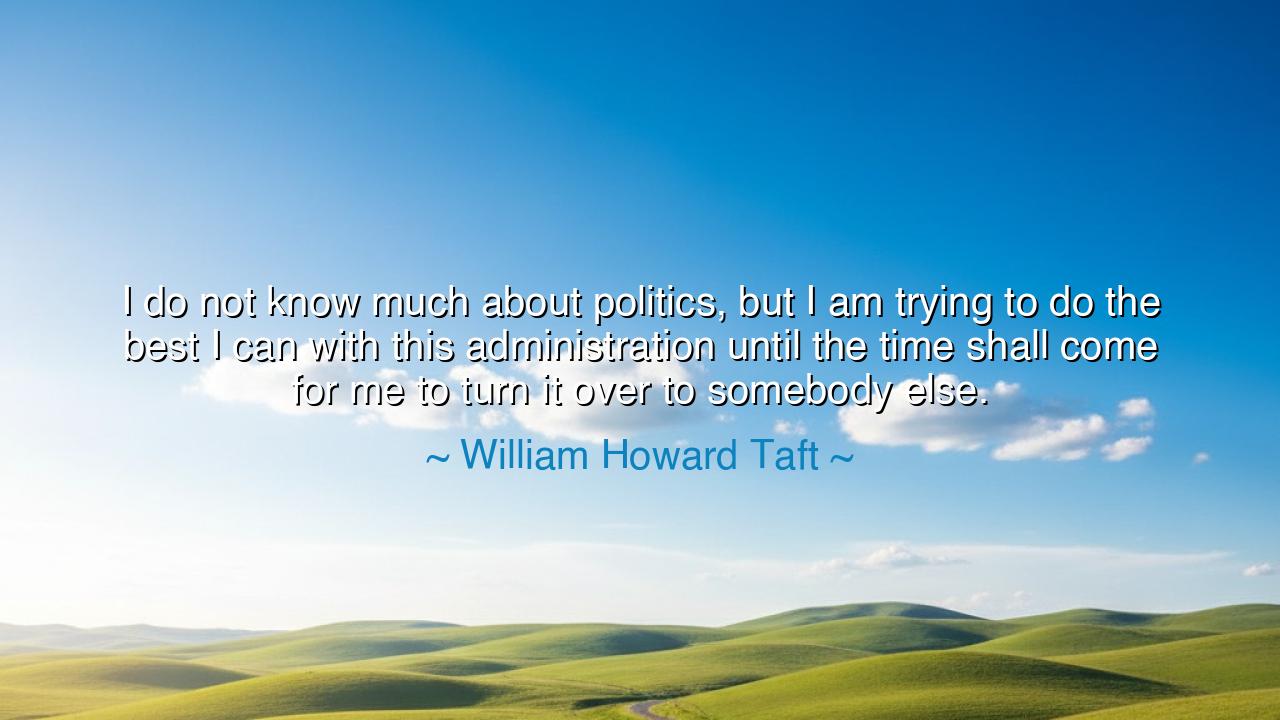
I do not know much about politics, but I am trying to do the
I do not know much about politics, but I am trying to do the best I can with this administration until the time shall come for me to turn it over to somebody else.






"I do not know much about politics, but I am trying to do the best I can with this administration until the time shall come for me to turn it over to somebody else." Thus confessed William Howard Taft, the reluctant president, whose heart leaned more toward justice than ambition. His words shine with humility, acknowledging that true service is not always born of mastery, but of earnest labor. For in leadership, the measure is not in knowing everything, but in striving faithfully with what has been entrusted.
The ancients praised such humility. Marcus Aurelius, though emperor of Rome, often admitted in his Meditations that he did not hold all wisdom. Yet he resolved to serve with patience, endurance, and fairness until the gods called another to take his place. To recognize one’s limits, yet still give one’s utmost, is itself a form of greatness. Taft’s admission, far from weakness, reflects the strength of a man who valued honesty over illusion.
Taft himself had not sought the presidency with burning zeal. His passion was for the law, for the seat of justice that would later be fulfilled when he became Chief Justice of the Supreme Court. Yet when the burden of the administration fell upon him, he bore it with steadiness, striving to preserve balance in a divided nation. His words remind us that even the unwilling leader may serve with dignity if he clings to the principle of doing his best.
History tells us of George Washington, who likewise confessed reluctance at times. He did not hunger for command, yet he accepted it when the people demanded. His greatness was not in thirst for politics, but in duty fulfilled. Like Taft, he looked forward to the day he could lay the burden down, not as one who abandoned his post, but as one who understood the seasons of service.
Therefore, let this wisdom endure: leadership is not the art of pretending to know all, but the discipline of laboring with integrity until the hour of departure. To confess limits is not to show weakness but to proclaim honesty. Taft’s words are a lantern for every servant of the people: do your best, hold fast your honor, and when the time comes, release the power entrusted to you with peace, knowing you have carried the burden faithfully.






NMQuan Nguyen Minh
Communication-wise, the candor is refreshing but perilous. Admitting limited taste for politicking can read as integrity—or as unpreparedness. How could a leader message this stance without eroding confidence? Perhaps: frame it as focus on service delivery, emphasize the caliber of the team, publish a clear decision framework, and invite scrutiny with timelines. I’m curious what rhetorical safeguards help: refusing culture-war bait, naming trade-offs aloud, and committing to public postmortems. Where’s the line between modesty that builds trust and modesty that abdicates responsibility?
NT30. Ngoc tho
I read this as an invitation to think institutionally. If the goal is to do the best one can, the lever might be system design: decision templates, cross-checks, and a culture that rewards bad-news bearers. Could you sketch a minimal architecture for responsible administration? I’m picturing a cabinet diversity matrix, a risk registry with owners, quarterly independent audits, and public dashboards. Pair that with a robust succession plan—who steps in, what they receive, and which norms are non-negotiable—to make continuity a virtue, not a euphemism.
NTKhanh Ngan Tran
There’s an accountability tension here. If a leader foregrounds limited political savvy, does that lower expectations or clarify boundaries? Voters didn’t elect a project manager; they elected a chief executive. What signals reassure the public that steadiness won’t mean passivity—regular briefings, explicit metrics, and visible adjustments when evidence shifts? And for the handover, what artifacts would leave the office stronger: a living governance manual, a prioritized backlog with rationale, and a candid after-action review so successors inherit clarity, not just keys.
MD08_ Bui Minh Dung_9A
Part of me hears a caretaker posture: keep the machine running, hand it off cleanly. That sounds responsible, yet risk-averse. Who champions long-horizon reforms if the focus is maintenance? Emergencies demand decisiveness; entrenched problems need political capital. How does someone who downplays political expertise build alliances without getting captured by seasoned operators around them? I want a playbook: map stakeholders, pre-commit to transparency rules, schedule open forums, and set recusal and escalation paths so pragmatism doesn’t drift into drift.
TNnguyen thi to nga
As a reader, I’m struck by the humility here, but I’m unsure whether humility alone can sustain governing. Technical stewardship often collides with coalition management, agenda-setting, and persuasion—skills many call “politics.” What’s the plan for that gap? I’d love a concrete checklist for a leader who prizes competence over posturing: recruit dissenting advisors, publish decision logs, state measurable goals, and define thresholds for course correction. How would we fairly evaluate performance under this ethos—process quality, outcomes, or public trust maintained during transitions?